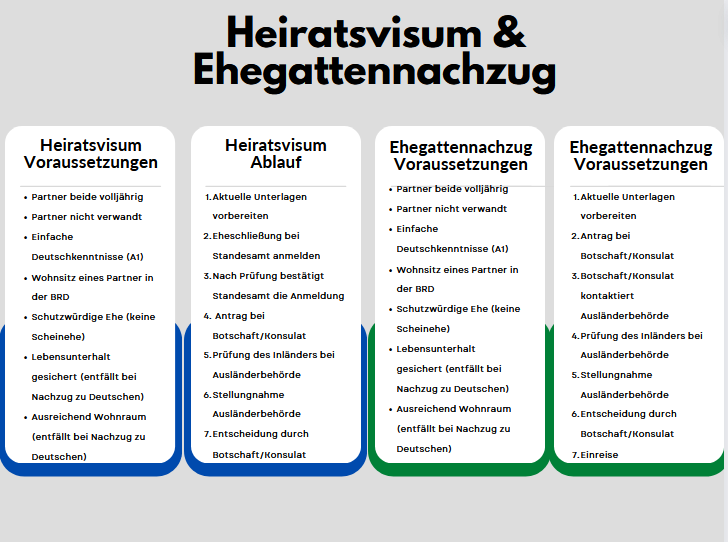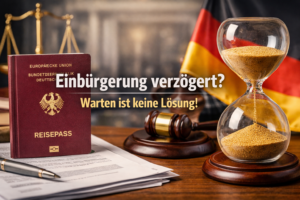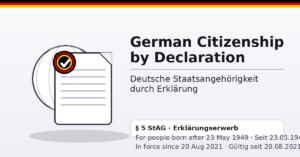Administrative Court of Berlin, 14.03.2017, Ref.: 7 V 35.07
According to Section 27, Paragraph 1 of the Residence Act (AufenthG), a residence permit is to be granted and extended for foreign family members (family reunification) for the establishment and preservation of family life in the Federal Republic of Germany for the protection of marriage and family in accordance with Article 6 of the Basic Law. A marriage worthy of protection exists in particular when, through free will and with the participation of the state, a union of a man and a woman is established as a long-term partnership, in which man and woman stand as equals and can freely decide on the structure of their life together.
However, Paragraph 2 of Section 27 AufenthG takes precedence over Paragraph 1, stipulating that family reunification will not be granted if it is established that the marriage or family relationship was entered into solely for the purpose of enabling the person seeking to join to enter and stay in the Federal Republic, or if there are actual indications that one of the spouses was coerced into the marriage.

In the following judgment, the Administrative Court of Berlin clarified that it is not detrimental if one of several motives for marriage is the desire to enable the partner to enter or stay in the country, as long as this is not the sole driving reason. The burden of proof lies with the claimant to demonstrate that this is not the case.
Introduction: The Plaintiff’s Visa Application
The plaintiff, born on June 1, 1966, sought a visa to establish a family life in Germany with his German wife. The plaintiff had previously been married to a German citizen from 1994 to 2002, but the marriage was dissolved in April 2002. The plaintiff entered Germany in July 2001 and applied for asylum, claiming to be single and childless during the process. His asylum application was rejected in September 2001. The plaintiff’s attempts to remarry in Germany were repeatedly denied due to suspicions of sham marriages.
Multiple Attempts to Marry in Germany
In January 2003, the plaintiff planned to marry a woman named Gerda H., aged between 67 and 70. However, the Leipzig registry office refused to approve the marriage, as an interview revealed that it would be a sham marriage. The plaintiff then submitted another follow-up asylum application, claiming to have a five-year-old daughter named Fatma. This application was also denied. In 2005, the plaintiff planned to marry a witness named Christine K. However, she informed the registry office that the plaintiff was already married under Islamic law in Turkey and had three children with this wife. The plaintiff was subsequently ordered by the immigration authorities to leave Germany.
Marriage in Turkey and Visa Application
After voluntarily leaving Germany in February 2006, the plaintiff married the co-plaintiff (referred to as „the second party“) in Turkey in May 2006. He applied for a visa for spouse reunification to live with her in Germany. In this process, the plaintiff stated that he met the second party through a mutual acquaintance in Leipzig. He denied being married under Islamic law, but admitted having a daughter named Fatma, who lived in Turkey. The second party confirmed these statements during her interview, stating that she met the plaintiff through his alleged sister.
Conflicting Statements and Suspicion of a Sham Marriage
The interviews of the plaintiff and his wife led to conflicting statements. The plaintiff claimed that his children lived with his parents in Gaziantep and that the children’s mother could not be found. He later submitted documents confirming his fatherhood of three children, including a certificate indicating that the children were from a relationship with a woman named Saziye Ö. Despite these statements, doubts about the authenticity of the marriage persisted, as the second party had only met the plaintiff shortly before the marriage, and the marriage was quickly arranged.
Rejection of the Visa Application by the German Embassy
On May 10, 2007, the German embassy in Ankara rejected the plaintiff’s visa application. The rejection was based on suspicions that the marriage was entered into solely to secure the plaintiff’s right to reside in Germany. The plaintiff had previously attempted to secure residency through marriages several times, which reinforced the suspicion of a sham marriage. The embassy also pointed to the conflicting statements made by the plaintiff and his wife, as well as the plaintiff’s previous attempts to marry other women in Germany.
Judgment of the Administrative Court of Berlin
The plaintiff filed a lawsuit against the embassy’s decision, seeking to overturn the rejection and have the visa issued. In his lawsuit, the plaintiff argued that his marriage to the second party was not a sham. He accused the authorities of misinterpreting the statements of witness Christine K. and other information. However, the Administrative Court of Berlin dismissed the lawsuit, ruling that the marriage was indeed entered into solely for the purpose of obtaining a visa. The conflicting statements made by the plaintiff and his wife, along with the plaintiff’s background, confirmed the suspicion of a sham marriage.
Summary and Conclusions
The ruling of the Administrative Court of Berlin emphasizes that a formal marriage alone is not sufficient for the issuance of a visa for spouse reunification; there must also be a genuine intention by both spouses to establish a life together. The plaintiff’s case demonstrates the extensive scrutiny conducted by the authorities when there is suspicion of a sham marriage. Due to the numerous contradictions and the plaintiff’s history, the court found that the marriage was not worthy of protection under Article 6 of the Basic Law. The lawsuit was therefore dismissed, and the visa was not granted.
Source: Administrative Court of Berlin
Important Note: The content of this article has been prepared to the best of our knowledge and belief. However, due to the complexity and constant evolution of the subject matter, we must exclude liability and warranty. Important Notice: The content of this article has been created to the best of our knowledge and understanding. However, due to the complexity and constant changes in the subject matter, we must exclude any liability and warranty.
If you need legal advice, please feel free to call us at 0221 - 80187670 or send us an email to info@mth-partner.de
Lawyers in Cologne advise and represent clients nationwide in immigration law.




